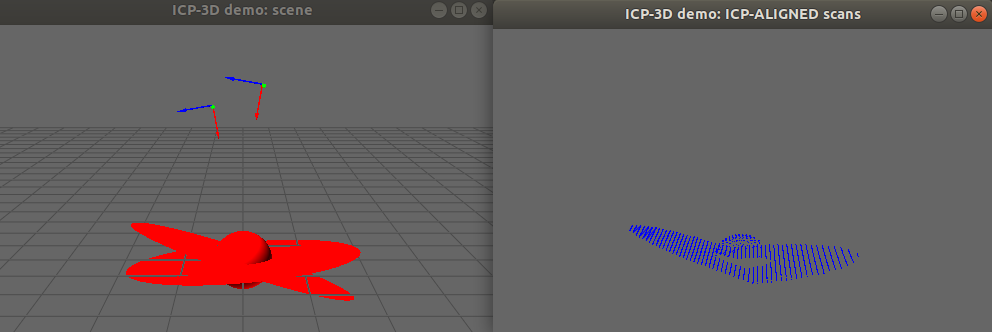Example: slam_icp3d_simple_example

C++ example source code:
/* +------------------------------------------------------------------------+ | Mobile Robot Programming Toolkit (MRPT) | | https://www.mrpt.org/ | | | | Copyright (c) 2005-2022, Individual contributors, see AUTHORS file | | See: https://www.mrpt.org/Authors - All rights reserved. | | Released under BSD License. See: https://www.mrpt.org/License | +------------------------------------------------------------------------+ */ #include <mrpt/gui/CDisplayWindow3D.h> #include <mrpt/maps/CSimplePointsMap.h> #include <mrpt/obs/CObservation2DRangeScan.h> #include <mrpt/opengl/CAngularObservationMesh.h> #include <mrpt/opengl/CDisk.h> #include <mrpt/opengl/CGridPlaneXY.h> #include <mrpt/opengl/CSphere.h> #include <mrpt/opengl/stock_objects.h> #include <mrpt/poses/CPose3DPDF.h> #include <mrpt/slam/CICP.h> #include <iostream> using namespace std; using namespace mrpt; using namespace mrpt::gui; using namespace mrpt::opengl; using namespace mrpt::poses; using namespace mrpt::slam; using namespace mrpt::maps; using namespace mrpt::obs; // Increase this values to get more precision. It will also increase run time. const size_t HOW_MANY_YAWS = 120; const size_t HOW_MANY_PITCHS = 120; // The scans of the 3D object, taken from 2 different places: vector<CObservation2DRangeScan> sequence_scans1, sequence_scans2; // The two origins for the 3D scans CPose3D viewpoint1(-0.3, 0.7, 3, 5.0_deg, 80.0_deg, 3.0_deg); CPose3D viewpoint2(0.5, -0.2, 2.6, -5.0_deg, 100.0_deg, -7.0_deg); CPose3D SCAN2_POSE_ERROR(0.15, -0.07, 0.10, -0.03, 0.1, 0.1); void generateObjects(CSetOfObjects::Ptr& world) { CSphere::Ptr sph = CSphere::Create(0.5); sph->setLocation(0, 0, 0); sph->setColor(1, 0, 0); world->insert(sph); CDisk::Ptr pln = opengl::CDisk::Create(); pln->setDiskRadius(2); pln->setPose(CPose3D(0, 0, 0, 0, 5.0_deg, 5.0_deg)); pln->setColor(0.8, 0, 0); world->insert(pln); { CDisk::Ptr pln = opengl::CDisk::Create(); pln->setDiskRadius(2); pln->setPose(CPose3D(0, 0, 0, 30.0_deg, -20.0_deg, -2.0_deg)); pln->setColor(0.9, 0, 0); world->insert(pln); } } void test_icp3D() { // Create the reference objects: COpenGLScene::Ptr scene1 = COpenGLScene::Create(); COpenGLScene::Ptr scene2 = COpenGLScene::Create(); COpenGLScene::Ptr scene3 = COpenGLScene::Create(); opengl::CGridPlaneXY::Ptr plane1 = CGridPlaneXY::Create(-20, 20, -20, 20, 0, 1); plane1->setColor(0.3f, 0.3f, 0.3f); scene1->insert(plane1); scene2->insert(plane1); scene3->insert(plane1); CSetOfObjects::Ptr world = CSetOfObjects::Create(); generateObjects(world); scene1->insert(world); // Perform the 3D scans: CAngularObservationMesh::Ptr aom1 = CAngularObservationMesh::Create(); CAngularObservationMesh::Ptr aom2 = CAngularObservationMesh::Create(); cout << "Performing ray-tracing..." << endl; CAngularObservationMesh::trace2DSetOfRays( scene1, viewpoint1, aom1, CAngularObservationMesh::TDoubleRange::CreateFromAperture( M_PI, HOW_MANY_PITCHS), CAngularObservationMesh::TDoubleRange::CreateFromAperture( M_PI, HOW_MANY_YAWS)); CAngularObservationMesh::trace2DSetOfRays( scene1, viewpoint2, aom2, CAngularObservationMesh::TDoubleRange::CreateFromAperture( M_PI, HOW_MANY_PITCHS), CAngularObservationMesh::TDoubleRange::CreateFromAperture( M_PI, HOW_MANY_YAWS)); cout << "Ray-tracing done" << endl; // Put the viewpoints origins: { CSetOfObjects::Ptr origin1 = opengl::stock_objects::CornerXYZ(); origin1->setPose(viewpoint1); origin1->setScale(0.6); scene1->insert(origin1); scene2->insert(origin1); } { CSetOfObjects::Ptr origin2 = opengl::stock_objects::CornerXYZ(); origin2->setPose(viewpoint2); origin2->setScale(0.6); scene1->insert(origin2); scene2->insert(origin2); } // Show the scanned points: CSimplePointsMap M1, M2; aom1->generatePointCloud(&M1); aom2->generatePointCloud(&M2); // Create the wrongly-localized M2: CSimplePointsMap M2_noisy; M2_noisy = M2; M2_noisy.changeCoordinatesReference(SCAN2_POSE_ERROR); M1.renderOptions.color = mrpt::img::TColorf(1, 0, 0); M2_noisy.renderOptions.color = mrpt::img::TColorf(0, 0, 1); scene2->insert(M1.getVisualization()); scene2->insert(M2_noisy.getVisualization()); // -------------------------------------- // Do the ICP-3D // -------------------------------------- CICP icp; CICP::TReturnInfo icp_info; icp.options.thresholdDist = 0.40; icp.options.thresholdAng = 0; std::vector<double> xs, ys, zs; M1.getAllPoints(xs, ys, ys); cout << "Size of xs in M1: " << xs.size() << endl; M2.getAllPoints(xs, ys, ys); cout << "Size of xs in M2: " << xs.size() << endl; CPose3DPDF::Ptr pdf = icp.Align3D( &M2_noisy, // Map to align &M1, // Reference map CPose3D(), // Initial gross estimate icp_info); CPose3D mean = pdf->getMeanVal(); cout << "ICP run took " << icp_info.executionTime << " secs." << endl; cout << "Goodness: " << 100 * icp_info.goodness << "% , # of iterations= " << icp_info.nIterations << " Quality: " << icp_info.quality << endl; cout << "ICP output: mean= " << mean << endl; cout << "Real displacement: " << SCAN2_POSE_ERROR << endl; // Aligned maps: M2_noisy.changeCoordinatesReference(CPose3D() - mean); scene3->insert(M1.getVisualization()); scene3->insert(M2_noisy.getVisualization()); // Show in Windows: CDisplayWindow3D window("ICP-3D demo: scene", 500, 500); CDisplayWindow3D window2("ICP-3D demo: UNALIGNED scans", 500, 500); CDisplayWindow3D window3("ICP-3D demo: ICP-ALIGNED scans", 500, 500); window.setPos(10, 10); window2.setPos(530, 10); window3.setPos(10, 520); window.get3DSceneAndLock() = scene1; window.unlockAccess3DScene(); window2.get3DSceneAndLock() = scene2; window2.unlockAccess3DScene(); window3.get3DSceneAndLock() = scene3; window3.unlockAccess3DScene(); std::this_thread::sleep_for(20ms); window.forceRepaint(); window2.forceRepaint(); window.setCameraElevationDeg(15); window.setCameraAzimuthDeg(90); window.setCameraZoom(15); window2.setCameraElevationDeg(15); window2.setCameraAzimuthDeg(90); window2.setCameraZoom(15); window3.setCameraElevationDeg(15); window3.setCameraAzimuthDeg(90); window3.setCameraZoom(15); cout << "Press any key to exit..." << endl; window.waitForKey(); } int main() { try { test_icp3D(); return 0; } catch (exception& e) { cout << "Error: " << e.what() << '.' << endl; return -1; } catch (...) { cout << "Unknown Error.\n"; return -1; } }